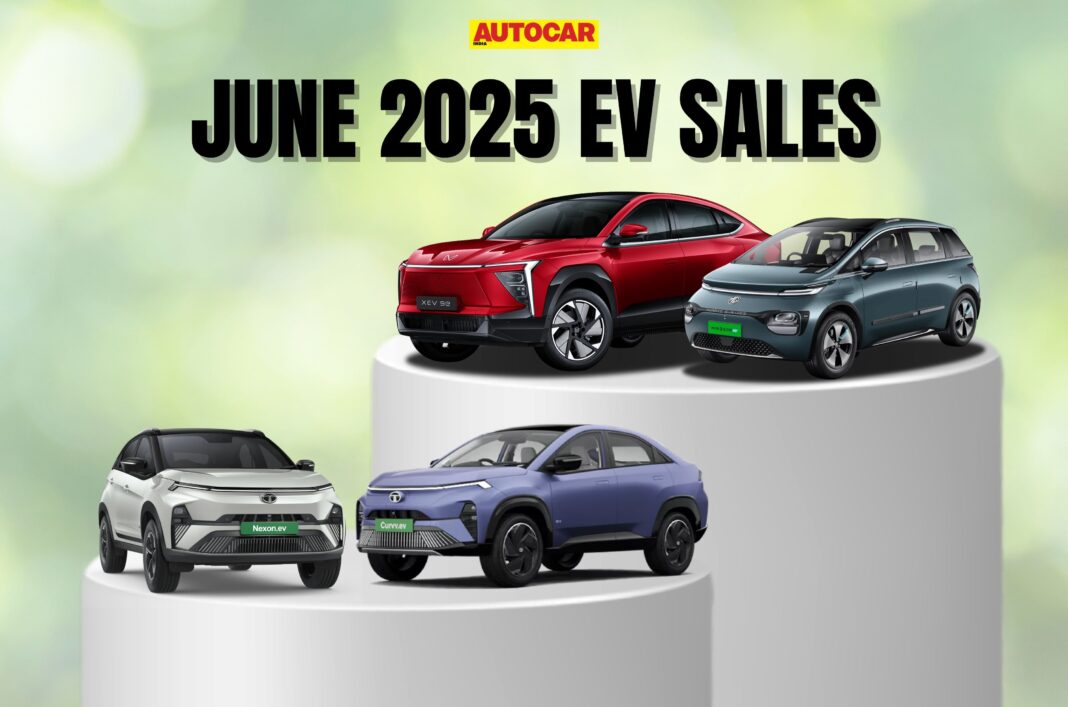India’s EV market is entering a pivotal phase, with the once-dominant Tata Motors steadily ceding ground to rival carmakers. In June 2025, EV registrations touched 13,033 units—an impressive 78 percent year-on-year jump over June 2024. EV penetration for the month is estimated at around 4 percent, underscoring the growing momentum for electrified mobility, even as the segment still accounts for a small slice of overall PV sales.
MG and Mahindra command more than 53 percent of the EV market, a dramatic reversal from a year ago, when Tata alone held the lion’s share.
| EV sales in June 2025 | |||||
|---|---|---|---|---|---|
| Brand | June 25 | June 24 | YoY | May 25 | MoM |
| Tata Motors | 4664 | 4590 | 2% | 4599 | 1% |
| MG Motor India | 3945 | 1476 | 167% | 4054 | -3% |
| Mahindra | 2979 | 487 | 512% | 2833 | 5% |
| Hyundai | 509 | 63 | 708% | 639 | -20% |
| BYD | 461 | 243 | 90% | 516 | -11% |
| Kia | 41 | 16 | 156% | 30 | 37% |
| Citroen | 80 | 238 | -66% | 123 | -35% |
Tata Motors
Sales: 4664 units, YoY growth: 2 percent
Tata Motors retained its position as the top-selling brand in June with 4,664 units. However, while volume remained steady, its market share continued to slide, falling to 35.8 percent, a significant drop from 62.7 percent in June 2024. This steep decline signals that newer, more focused rivals now threaten Tata’s first-mover advantage despite a relatively fresh product portfolio with the likes of the Curvv EV and Punch EV. Recently, Tata Motors also launched its flagship Harrier EV, although its impact is yet to reflect in terms of sales.
MG Motor India
Sales: 3945 units, YoY growth: 167 percent
MG Motor India has emerged as the biggest disruptor. The company recorded sales of 3,945 units in June, marking a 167 percent year-on-year increase. While the ZS EV and Comet laid the groundwork, MG’s recent surge is led by Windsor, its mid-size electric crossover. The Windsor has resonated strongly with the Indian EV buyer, particularly in metro and urban centers. MG now holds a 30.3 percent share of the EV market, narrowing the gap with Tata to less than six percentage points.
Mahindra
Sales: 2979 units, YoY growth: 512 percent
Matching that growth trajectory is Mahindra, which clocked 2,979 EV registrations in June, a staggering 512 percent jump over the same month last year. The company’s born-electric SUVs – the BE 6 and the XEV 9e – has helped it carve a distinct identity in the market. With a growing portfolio of purpose-built electric SUVs and a solid design-technology strategy, Mahindra now holds a 22.9 percent share, emerging as the third strong pillar in India’s high-growth EV space.
Hyundai, Kia, Citroen and BYD
Other players have delivered mixed results. Hyundai posted 509 units, up sharply from 63 units a year ago, which can be attributed to the Creta Electric. However, Hyundai’s EV sales were down on a monthly basis. Meanwhile, sister brand Kia, despite only having products at the premium end of the market with the EV6 and the EV9, sold 41 units, recording strong YoY (156 percent) and MoM (37 percent) growth.
On the back of a robust portfolio now, BYD also posted healthy numbers with sales of 461 units, thereby recording 90 percent YoY growth, although monthly sales were down by 11 percent. Citroen, meanwhile, sold just 80 units of the eC3, recording a considerable 66 percent YoY and 35 percent MoM decline.
Luxury EV sales
| Luxury EV sales June 2025 | |||||
|---|---|---|---|---|---|
| Brand | June 25 | June 24 | YoY | May 25 | MoM |
| BMW | 212 | 57 | 272% | 185 | 15% |
| Mercedes-Benz | 91 | 47 | 94% | 95 | -4% |
| Volvo | 22 | 48 | -54% | 35 | -37% |
| Audi | 2 | 19 | -89% | 5 | -60% |
| Others | 27 | 34 | -21% | 7 | 286% |
In the luxury EV space, BMW continued to maintain a strong dominance, with second-placed Mercedes behind by quite a margin. With one of the most expansive EV portfolios, BMW recorded sales of 212 units with a whopping 272 percent YoY growth and 15 percent MoM growth. Mercedes, meanwhile, recorded sales of 91 units, mostly concentrated at the top-end of the luxury segment. Mercedes’ sales were nearly double of what they sold last year, but MoM, there was a decline of 4 percent.
Meanwhile, Volvo and Audi really struggled with either relevance or scale in India’s value-sensitive landscape. In third spot, Volvo sold 22 units, while Audi sold just 2 units, both brands recording significant YoY and MoM declines.
With inputs from Saptarshi Mondal
Also See:
Delhi bans fuel sale to 15 year old petrol, 10 year old diesel vehicles
New car prices in Maharashtra to increase with amendments to Motor Vehicles Tax Act

